Baldur's Gate II : Shadows of Amn review
Review - kiss your family and friends goodbye, and say hello to Baldur's Gate II
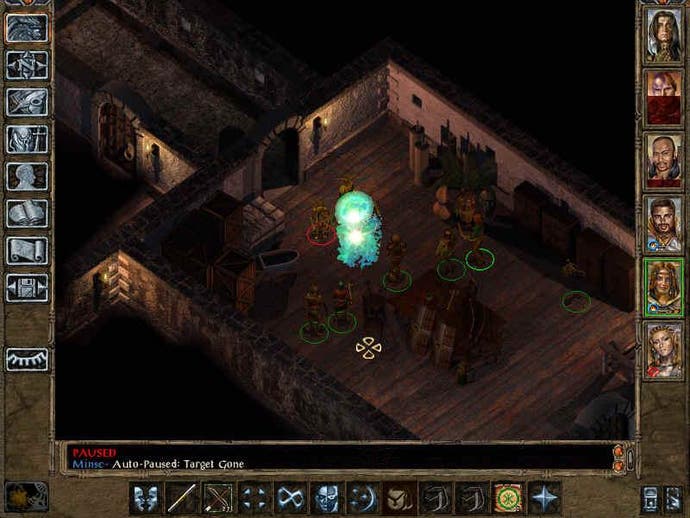
The Evil Awakens
The original "Baldur's Gate", which introduced us all to the now infamous Infinity engine, was in a class of its own as far as PC role-playing games went. Die hard fans of the "Eye Of The Beholder" series had waited years for another game to hold their attention, and when the original blasted onto the scene like a fireball amongst a group of goblins, it was like a breath of fresh air in the midst of a cloudkill spell. With an epic story, great characters, cool graphics and an excellent and inventive combat system, it was just what the genre needed to swat away the tedious 'hack and slash' affairs which had become the norm. Although it did have its problems - moving from village to village became a monotonous affair, subquests mostly amounted to little more than "get this and take it here", and the pathfinding AI could be rather frustrating - these were generally overlooked, and the game was enjoyed by all. At the end of the original Baldur's Gate the main protagonist discovers that he or she is in fact a child of Bhaal, God of Murder (now deceased), who sired any number of children during the Time of Troubles when the Gods were forced to walk the earth in mortal form. I won't bore you with the extensive history of Faerun, but needless to say this would cause a bit of sibling rivalry, and the final enemy turned out to be your own brother, also now deceased .. assuming you actually finished the first game. The new adventure starts with your character - either new, pregenerated, or imported from the original - the prisoner of some mad mage whose stronghold is attacked, and the fun soon begins, unfolding into a story that far outdoes the original and just seems to grow and grow, twisting and turning into epic proportions, pushing you to go just that little bit further. To give you some indication of how big this game is, after 25 hours play I had still only managed about half of the quests in the second of seven chapters, and more quests were popping up all the time!
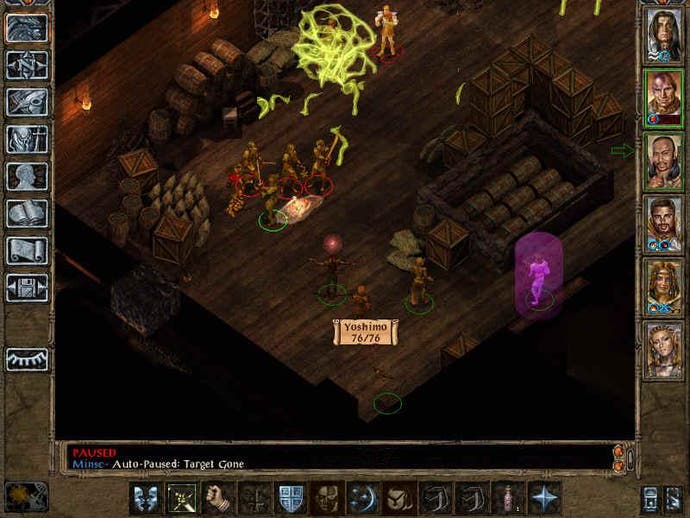
Where Do We Go From Here?
As with all role-playing games, the storyline and subplots are all important to the overall experience, and this game has them in abundance. As per the original, the main plot is well written and quite daunting, as the significance of certain events build layer upon layer until you're not sure who is friend or foe, or where it will end.
The second chapter deals mainly with subplots and experience gathering, but there are none of those boring "fetch and return" missions this time. Hunting murderers, rescuing kidnapees, liberating villages from marauding monsters, even returning a favourite teddy bear to the ghost of a halfling child who, I am reliably informed, will turn into a Revenant and hunt you down should you find the bear and then not return it! Large quests, small quests, there are absolutely tons of things to do, many of which will subtly influence your main quest without your knowledge. Then you have character quests. Your companions, either well known from the original or new faces you meet in your travels, all have a history and a background, and sometimes this spills into the game. Old foes appear, family members are murdered, and what sort of friend would you be if you didn't help them out in times of crisis? Just when you think you are getting a hold on the numerous missions you have accepted, just when you know what you are doing and where you are going next .. BAM! An old aquaintance puts a curse on your friend, or you find someone who has been poisoned, or any number of other things, and off you go again to the rescue. Far from being a nuisance, it adds a new dimension to the characters, giving them a life of their own rather than merely being a puppet for you to control. In fact, if you fail to help they may leave to sort problems out for themselves, never to return. And a particular delight for fans of the original pen and paper "Advanced Dungeons & Dragons" role-playing game on which Baldur's Gate is based is the addition of strongholds. Depending on your character class and the missions you accept, you will get the chance to become the leader of a stronghold - a thief will run a Thieves Guild, a warrior will take control of a Keep, a druid can take responsibility for a Grove, and so on. This creates a regular income for your character, assuming you run things to a good standard, returning often to hear the problems of your followers and advising them in the correct fashion. The strongholds do not affect the main plot in any way, but again it adds a depth that is rarely seen in a computer role-playing game.
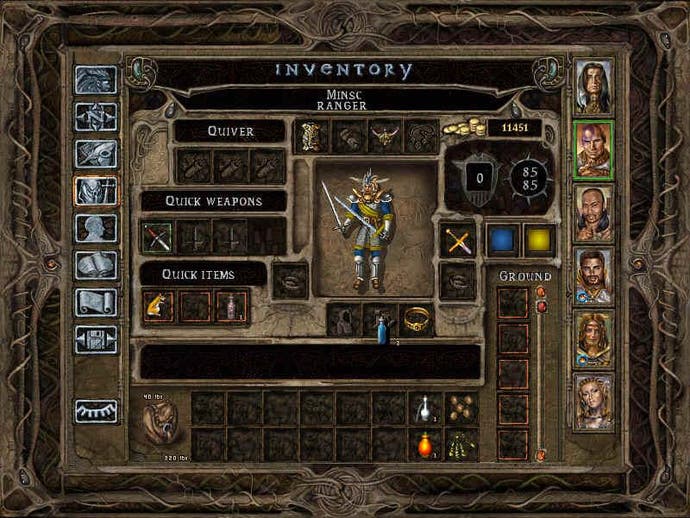
To Infinity, And Beyond!
Of course, a great story is nothing without gameplay behind it, and although the Infinity engine could now be considered old, the small tweaks Bioware have incorporated have ensured that the engine has life in it yet. A 3D graphics card is not essential to play, but with added spell effects and better combat and movement animations, most people would consider it an enhancement they could not do without. A plethora of options also enable you to have the best experience possible. Auto-pause functions can be controlled easily, ensuring you are never caught unawares, and pathfinding abilities can be raised or lowered to your hearts content. You can now even visit the inventory screen and move things about whilst paused - in the original the game would automatically unpause. As far as control of the six characters go, it couldn't really be easier. The interface is incredibly easy to use, nothing is difficult, and it's all right there in front of you. Want to Hide in Shadows, click the button. Find Traps, search for Secret Doors, click the right button. Special abilities are also employed in this fashion, and are extremely useful. In fact, I don't think there was one ability or spell that I didn't find helpful at one time or another. Character creation is a doddle too, granting you the opportunity to fine-tune your character until it is perfect. You can further specialise by choosing a number of 'kits' - a thief can specialise as a Bounty Hunter or Assassin, a cleric as a Priest of a particular faith, all with specialist abilities but often also with serious principals. Another enjoyable factor is that your characters all start at level six to eight, depending on class. This may not sound particularly special, but it does mean that your mages and clerics will start out with a good choice of spells, rather than wandering around for the first five hours of the game with a single, powerless Magic Missile. The addition of new rules into the AD&D universe also adds a sense of strategy when you create a character. Bonuses can be gained by selecting a 'weapon style', so when you find that Two Handed Sword +2 Fireball Thrower, your character may still be better off sticking to their sword and shield combination, because that's what they're good at!
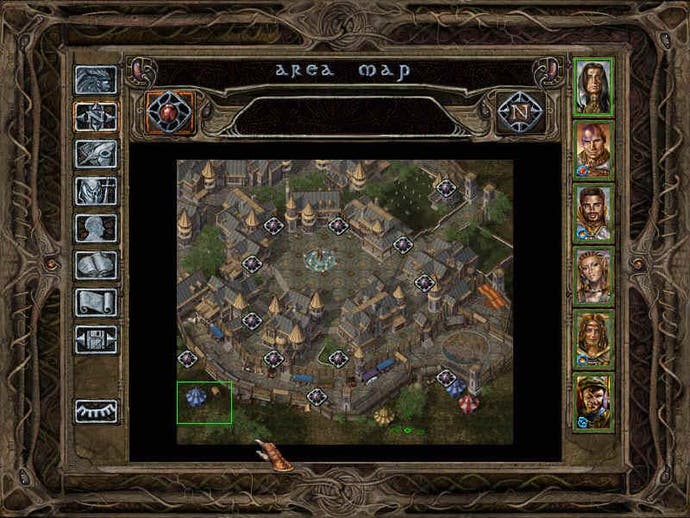
Travel! See The World!
Travel between areas has also been improved, and there's no more trudging through endless screens to get where you want to go, just an indication on the map of how long it will take you to get there. The longer it takes, of course, the more chance you have of a random encounter, but as an extra bonus, some of these 'random' encounters lead to yet more quests! Most areas only become available to you upon acceptance of a quest, and each area is clearly marked in the map screen with areas of importance, some of which are again only added as you move through the missions. A handy tool is the ability to add notes to maps yourself, allowing you to send hidden scouts through an area, noting where the enemies are before steaming in. Travelling also allows you to see as much of the simply stunning artwork as possible. Several times you find yourself just staring at a building or a statue, stunned into silence at the artist's grasp of how something would look in this fantasy world. Talking of statues, if you complete a certain mission, the townsfolk are so happy they will build statues of your characters! If you prefer real humans as your companions, the game features a multiplayer mode which follows the same storyline as the single player game, although obviously with several other people each in control of their own characters. There is no multiplayer search engine though, and getting into a game can be quite difficult, but if you have friends who all play then meeting up regularly can be a blast.
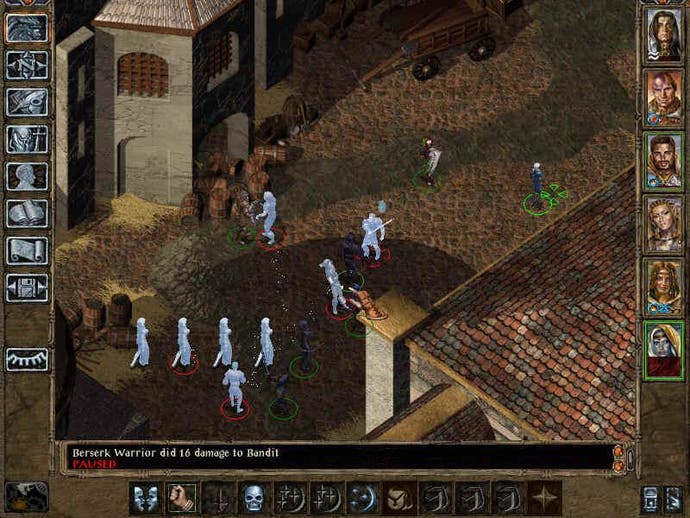
Conclusion
What we have here is a role-playing game in which little could be improved - the story and quests are captivating, the gameplay tried and tested, and the overall feel is professional and entertaining. The only caution I could give is that it's all going to feel a little overwhelming and complex to a novice. If you're a hardened role player though, you can't go far wrong, even if you grew tired with the original. Nominations for the best RPG of the year may as well close now, and you can probably blame Bioware for many player/partner rows over the next few weeks.
